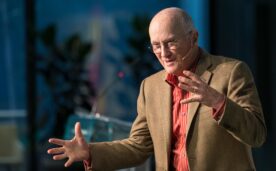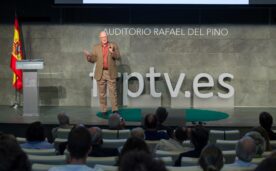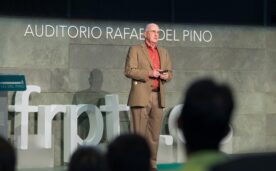Peter H. Lindert Keynote Lecture
Summary:
On 4 October 2017, Peter Lindert, President of the Economic History Association and Professor of Economics at the University of California, gave a lecture on growth and the future of progressive redistribution at the Rafael del Pino Foundation. Lindert explained that, in recent years, a new opportunity to study inequality and progressive redistribution has arisen because data on inequality before taxation, after taxation and implicit progressive taxation are now available. In addition, two new time series on inequality starting in the 1960s are also available, as well as Lindert's own work on the UK and Latin America, which goes back much further. The studies conclude that redistributive progressivity - redistribution of wealth between high and middle and low incomes through progressive taxation and public spending policies - is a young and almost global phenomenon. A century ago, by contrast, it was virtually non-existent. Secondly, redistributive progressivity has not been reduced since the 1970s, despite the coming to power of politicians such as Ronald Reagan or Margaret Thatcher, with their programmes of tax cuts and public spending cuts. Moreover, if the redistributive effects of income transfers are added to the egalitarian effects of mass public education, this progressivity would increase. Consequently, the increase in inequality cannot be explained by a reduction in progressive redistribution, because this is not the case. In fact, progressivity has proved immune to any threat to it. Progressive redistribution has grown in the long run, but its effect on the middle and lower classes has been minimal in terms of inequality. The same has been true in Spain. Even in countries with large inequalities when considering pre-tax incomes, inequality has not been reduced either because the upper classes have managed to capture governments so that rents are somehow returned to them. Inequalities, on the other hand, have been reduced when governments have invested in public health and education, which are other forms of transfers and have increased their weight as a percentage of GDP. From this perspective, inequality has not increased because social spending on health and education has also increased. It is the latter form of redistribution that increasingly helps the lower income half. Indeed, the more public investment in primary and secondary education increases, the more inequalities are reduced. Now, the big challenge in terms of inequality is how to deal with the consequences of population ageing. This challenge is particularly significant because many countries have failed to reduce poverty among the over-65s.
The Rafael del Pino Foundation is not responsible for the comments, opinions or statements made by the people who participate in its activities and which are expressed as a result of their inalienable right to freedom of expression and under their sole responsibility. The contents included in the summary of this conference are the result of the debates held at the meeting held for this purpose at the Foundation and are the responsibility of their authors.
The Rafael del Pino Foundation is not responsible for any comments, opinions or statements made by third parties. In this respect, the FRP is not obliged to monitor the views expressed by such third parties who participate in its activities and which are expressed as a result of their inalienable right to freedom of expression and under their own responsibility. The contents included in the summary of this conference are the result of the discussions that took place during the conference organised for this purpose at the Foundation and are the sole responsibility of its authors.







